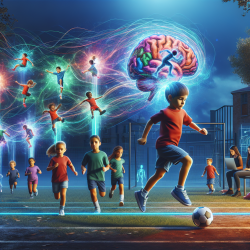Why Executive Function Matters
Executive function (EF) includes complex cognitive processes required for performing new or difficult tasks, heavily reliant on the prefrontal cortex (PFC). One critical component of EF is inhibition, which can be divided into cognitive inhibition (preventing irrelevant information from entering working memory) and behavioral inhibition (controlling physical behaviors and reactions).
The Study's Key Findings
The study involved 40 male students aged 7-11, randomly assigned to either an experimental group (participating in a structured exercise program) or a control group (no intervention). The exercise program consisted of 24 sessions, each lasting 90 minutes, over eight weeks. The participants' executive functions were assessed using Stroop and Go-No-Go tests before and after the intervention.
The results were compelling:
- Significant improvements in cognitive inhibition in the experimental group compared to the control group (p < 0.05).
- Marked enhancements in behavioral inhibition in the experimental group (p < 0.05).
Implications for Practitioners
These findings underscore the importance of incorporating structured physical activities into the treatment plans for children with ADHD. As practitioners, you can leverage these insights to develop exercise programs that not only engage children but also target specific executive functions. Here are some practical steps to consider:
- Design Purposeful Activities: Tailor exercises to improve cognitive and behavioral inhibition, such as obstacle courses, team sports, and coordination drills.
- Monitor Intensity: Ensure that the exercise intensity is appropriate (65-80% HRR) to maximize cognitive benefits.
- Collaborate with Schools: Work with educational institutions to integrate these programs into the school day, providing consistent and structured physical activity.
Encouraging Further Research
While this study provides strong evidence supporting the role of exercise in improving executive function in children with ADHD, it also highlights the need for further research. Future studies should explore the long-term effects of exercise, variations in exercise types, and the impact on different ADHD subtypes.
Conclusion
This research offers a promising alternative to traditional ADHD treatments, which often rely on medication with potential side effects. By incorporating targeted exercise programs, we can create more holistic and sustainable treatment plans that enhance the overall well-being and cognitive development of children with ADHD.
To read the original research paper, please follow this link: Effects of a selected exercise program on executive function of children with attention deficit hyperactivity disorder.










